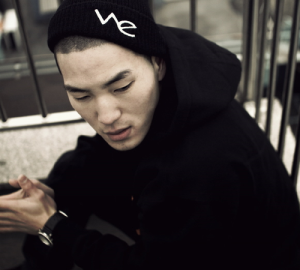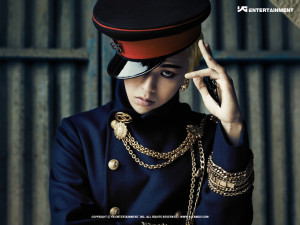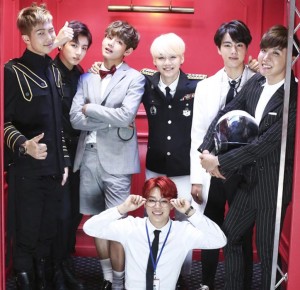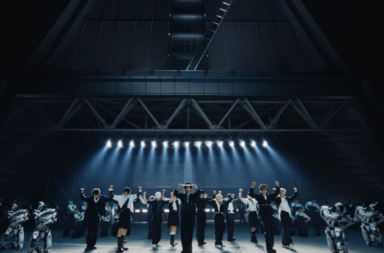 This month sees the matching up of solo debuts from SNSD‘s Tiffany and ex-SNSD’s Jessica. Not only are the release dates close, but their birth state of California features heavy in both their visuals (fun fact: Jessica and Tiffany were born in the same hospital in LA, a few months apart). With the added drama from Jessica’s dismissal from SNSD, it seems that a potential rivalry has been set up. But this isn’t the only instance: the top male and female groups of each company are often compared to one another (especially girl groups) certain ‘competitions’ may arise when groups are promoting at the same time and are up for awards; and some people have found rivalries so financially lucrative that they will use it within their own company, as well.
This month sees the matching up of solo debuts from SNSD‘s Tiffany and ex-SNSD’s Jessica. Not only are the release dates close, but their birth state of California features heavy in both their visuals (fun fact: Jessica and Tiffany were born in the same hospital in LA, a few months apart). With the added drama from Jessica’s dismissal from SNSD, it seems that a potential rivalry has been set up. But this isn’t the only instance: the top male and female groups of each company are often compared to one another (especially girl groups) certain ‘competitions’ may arise when groups are promoting at the same time and are up for awards; and some people have found rivalries so financially lucrative that they will use it within their own company, as well.
To put it simple: we’ve had rivalries in K-pop before, and we will see have them in the future, too. But what do you think of these rivalries, feuds and showdowns? Do you find them entertaining, just friendly competition, or troubling? When do you think fans (and maybe even idols and companies) take a competition too far?
Camiele: From a business perspective, rivalries are actually quite brilliant if played correctly. I think for the most part, they’re just like any other rivalry that unfolds in public: sloppy. However, when done right, without the unnecessary, and often times scripted squabbling, they’re a means to get multiple artists exceptional exposure and face time. A record label couldn’t ask for more! Then again, the sniping is what gets people invested because whether people will openly admit it, they love to see anyone with any sort of fame or celebrity collapse and be dragged in public. From that perspective, I mean, if I wanted to watch two grown people act a fool for the sake of the last laugh, I’d cut out the middle man and just watch Mean Girls.
 That being said, I love the competition aspect of rivalry. As Berry Gordy has said on multiple occasions, competition breeds champions. Rivals, especially big-name rivals who are touted as being the top in their field, bring out the absolute best in each other in hopes of besting each other. The same goes in any art form. You do the art for your soul, absolutely. But if you’ve stopped improving or finding things that can make you better or inspire you to reach for things outside of your comfort zone, you may as well work at the post office. For example, the (seemingly and mostly fan-led) ongoing rivalry between B-Free and BTS is a bit nastier than necessary; however, one can’t deny it pushed Rap Mon and Suga to release some great work and showed they could actually lay straight bars when shoved in a corner. BTS gots teeth; good to know. Now if only their fans would stay out of grown folks’ business, but I digress.
That being said, I love the competition aspect of rivalry. As Berry Gordy has said on multiple occasions, competition breeds champions. Rivals, especially big-name rivals who are touted as being the top in their field, bring out the absolute best in each other in hopes of besting each other. The same goes in any art form. You do the art for your soul, absolutely. But if you’ve stopped improving or finding things that can make you better or inspire you to reach for things outside of your comfort zone, you may as well work at the post office. For example, the (seemingly and mostly fan-led) ongoing rivalry between B-Free and BTS is a bit nastier than necessary; however, one can’t deny it pushed Rap Mon and Suga to release some great work and showed they could actually lay straight bars when shoved in a corner. BTS gots teeth; good to know. Now if only their fans would stay out of grown folks’ business, but I digress.
The unfortunate result of a lot of rivalries in K-pop, however, is artists have to deal with the personal repercussions of letting their very private, very real squabbles with industry peers (and sometimes close friends) play out in public. And that’s when things can get a bit overemotional and just plain ugly, especially since we all know fans tend to think they’re personally involved and take things a bit too far. For example, this “thing,” whatever it may be, between Crush, Zion. T, and Dean is just sad. Another unfortunate side effect is dragging a third party into something they really didn’t intend to be involved in. Whatever the problems between Crush and Zion. T, everyone knows about it, and Dean, simply for being Crush’s friend and collaborator, now has to deal with some memetastic shade buzzing around in the Amoeba Culture/Club Eskimo fanbases that really, let’s be honest, is mostly reserved for the kids in K-pop/idol fandom. The obvious hurt Zion. T has expressed publicly just makes it even more heartbreaking, but ultimately all the more reason why rivalries need to not cross a line that goes beyond professional, because real people with real human emotion get hurt, and nobody wins in that situation.
 Cjontai: I might be alone on this, but I sincerely feel like a majority of so-called rivalries are fan-made. I don’t sense a genuine beef between any of the groups; it’s more or less fans who can’t keep their respective chill when boasting whose group is better. Fans are always reading more out of a poorly translated interview as basis for their arguments. Case in point: the alleged diss by Rap Monster towards G-Dragon. Once again, conjecture overlaps critical thinking, and antis quickly rally to drag someone they already hate. They don’t take the overall message into account, but rather focus on a few key words to cement their right to dislike an idol. I really don’t care how anyone feels about any particular idol, but stop mixing up facts with fiction. Reading comprehension is such an underrated ability, I swear.
Cjontai: I might be alone on this, but I sincerely feel like a majority of so-called rivalries are fan-made. I don’t sense a genuine beef between any of the groups; it’s more or less fans who can’t keep their respective chill when boasting whose group is better. Fans are always reading more out of a poorly translated interview as basis for their arguments. Case in point: the alleged diss by Rap Monster towards G-Dragon. Once again, conjecture overlaps critical thinking, and antis quickly rally to drag someone they already hate. They don’t take the overall message into account, but rather focus on a few key words to cement their right to dislike an idol. I really don’t care how anyone feels about any particular idol, but stop mixing up facts with fiction. Reading comprehension is such an underrated ability, I swear.
If there are any digs between anyone in the industry, it’s usually internal company mess, which is resolved the moment one party decides to leave (Minzy, Hyunseung, half of TVXQ, etc.). In particular, Lee Hongki had some strong words in the past about his CEO after his company’s boss said disparaging things about FT Island on a radio show. Now, that is some mess to me because how are you going to diss your own company’s talent like they’re not your bread and butter? Hyunseung has to deal with a nasty public image because of the way Cube Entertainment handled his situation, which is completely unfair when you consider who wields the power. The real showdowns in k-pop unfortunately get only one side told, and it’s the ones who can afford to pay for positive PR to cover their bull on search sites that benefit the most.
Camiele: I agree, Cjontai. Most rivalries are fanmade. At that point it’s not a rivalry; it’s a fanwar, and it’s stupid. See it in every fandom known to man, K-pop or otherwise. Because, again, fans have a hard time knowing their boundaries and love to see people they anti get dragged, even if the receipts are complete fiction.
 Gaya: I totally agree that a lot of rivalries are fanmade, and I unashamedly relish the drama (except when it goes too far — verbal abuse and threats of violence are never cute, people). But, as Camiele pointed out, companies also join in; and while such competition can improve quality, there is also the chance for companies to take the easy route and incite fanwars instead. We saw Yang Hyun-suk try that with the 2NE1 and SNSD comebacks last year, and then float a similar idea about simultaneous Winner and iKon comebacks. The last thing we need is the industry itself encouraging fanwars and the extreme behaviour that accompany them.
Gaya: I totally agree that a lot of rivalries are fanmade, and I unashamedly relish the drama (except when it goes too far — verbal abuse and threats of violence are never cute, people). But, as Camiele pointed out, companies also join in; and while such competition can improve quality, there is also the chance for companies to take the easy route and incite fanwars instead. We saw Yang Hyun-suk try that with the 2NE1 and SNSD comebacks last year, and then float a similar idea about simultaneous Winner and iKon comebacks. The last thing we need is the industry itself encouraging fanwars and the extreme behaviour that accompany them.
As someone who likes Jessica’s voice, I am all for her solo debut; and considering how annoying I find Tiffany at times, it’s easy for me to be all ‘team Jessica’ in this match-up. But Tiffany seems to know what she’s doing with her solo debut, and I wouldn’t be surprised if I ended up liking aspects of her mini, too. As for who will beat who, I care more about how each builds on the similar building blocks they both have, and how the final products compare in an artistic sense. I am definitely biased, but I don’t think preferring one means the other is shit — and I hope that is something all fans remember, with all things. It’s so easy to prop up our faves by disparaging others, but that kind of tall poppy syndrome mess is not what we need.
I have to say, though, the best thing about rivalries is when a random third party breaks through for the win: Busker Busker, anyone? Also, what is this thing with BTS fandom and everyone else? This is the kind of thing we DON’T want happening.
Cjontai: Care to elaborate for those new to k-pop?
 Sarah: What Gaya is referring to are the latest accusations of plagiarism against BTS. There was apparently a Twitter campaign timed to coincide with their momentous Epilogue concerts at Olympic Stadium – anti-fans encouraged everyone to trend #BTSplagiarism and other related topics for 24 hours.
Sarah: What Gaya is referring to are the latest accusations of plagiarism against BTS. There was apparently a Twitter campaign timed to coincide with their momentous Epilogue concerts at Olympic Stadium – anti-fans encouraged everyone to trend #BTSplagiarism and other related topics for 24 hours.
Apparently they based this on the idea that BTS had somehow copied everything from hair color to costumes to music video themes from other groups like Big Bang, Shinee, and EXO. There are absolutely no teeth to these accusations. Of the many things that were brought up as copied were EXO’s iconic school uniforms, but we all know how many different K-pop groups have covered the school boy image, and copying hair color? Really? This just brings flash backs of the Color Wars.
It really just stems from the fact that BTS has become so popular worldwide. Perhaps fans are jealous of newcomers overtaking their oppas in popularity, but that’s no excuse to start a completely unfounded international campaign against them. I think the people who use the term plagiarism use it far too lightly and it’s sort of getting out– no, it is out of hand.
Camiele: I think while people genuinely love to tear others down, I think what’s more at play here is the absolute disregard for an artist’s humanity. It’s what internet trolls thrive on, this idea of anonymity gives them a “right” to say and do things to people who aren’t people to them if they’re not right in front of them and can thus do something about it. That’s where I think these fan-led “rivalries” come from: a sense that they have rights to their faves and have a right to destroy anything that’s not their fave. It’s really childish, rumor-mongering to get on your fave’s good side, when you’re really just pissing everyone off.
Sarah: I totally agree – it’s one of the great problems of the Internet. I believe, in this case, it’s a combination of the ides of fan “ownership” of artists, and also the misplaced belief that they need to protect their faves in some way. When really BTS, or any other group, isn’t trying to attack or demean their fellow artists when they use a more common concept. It does come back to realizing and acknowledging their humanity. Just like any other person in any other job, these are their colleagues, their co-workers, and while they might have some naturally created creative rivalries between each other, anything beyond that is fabricated by the companies or the fans. And frankly those sorts of rivalries can be incredibly damaging to the artists’ humanity.
 Cjontai: Hmm, I see. Not to deviate from the BTS thing, but what about the B2ST v. Hyunseung issue? Does anyone think it’ll get ugly within the fandom once promotions for them starts?
Cjontai: Hmm, I see. Not to deviate from the BTS thing, but what about the B2ST v. Hyunseung issue? Does anyone think it’ll get ugly within the fandom once promotions for them starts?
Camiele: It depends on how ardent the fans are. If they’re thick inside the fandom, to the point they believe they have some form of dominion over the group, it’ll get nasty (think the betrayal talk when JYJ left or after Jessica was booted out). If they’re rational human beings, they’ll be hurt but won’t take it personally.
Erianne: I think that in an industry that’s as heavily fan-driven as the K-pop industry, rivalries could be something that K-pop can more or less do without. I mean, there’s just something so overwhelmingly disturbing about how sensitive fandom culture can be in K-pop that just when you think a rivalry can somehow create something possibly ‘value-adding’, it usually just ends up becoming a hot mess because of how both the media and the fans tend to over-exaggerate things by throwing in baseless accusations such as plagiarism and such into the mix. I guess what I’m trying to say is that in an ideal situation, rivalries could be good especially when it can help create healthy competition among groups and artists. Sadly, it just ends up becoming a thing for fans to feed off of to the point that some idol groups have sort of unconsciously carried this fierce competitiveness with them
In the end, I’d like to believe that it’s just either the system’s fault or the fans’ fault. I’m pretty sure that idols want to be friends with one another and maybe occasionally want to even foster healthy competition among themselves, but alas. We cannot always have nice things.
Cjontai: You know, it amuses me how fans will glorify the positivity between groups by pointing out various friendships, but oddly enough, they can’t follow the examples of these idols being good sports with each other. If what the idols are doing is ideal, why can some fans not get along? It’s not like anyone slapped somebody’s grandma.
(Pann-choa. Images via: YG Entertainment, SM Entertainment, FNC Entertainment, Ize. B-Free image: credit to owner)


